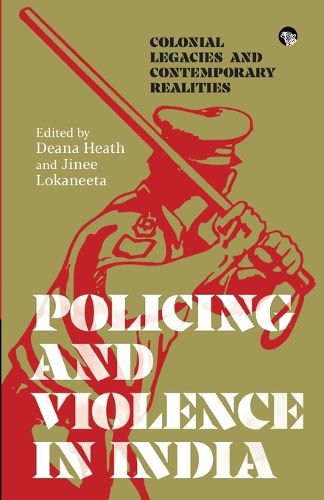Readings Newsletter
Become a Readings Member to make your shopping experience even easier.
Sign in or sign up for free!
You’re not far away from qualifying for FREE standard shipping within Australia
You’ve qualified for FREE standard shipping within Australia
The cart is loading…






This title is printed to order. This book may have been self-published. If so, we cannot guarantee the quality of the content. In the main most books will have gone through the editing process however some may not. We therefore suggest that you be aware of this before ordering this book. If in doubt check either the author or publisher’s details as we are unable to accept any returns unless they are faulty. Please contact us if you have any questions.
A timely and comprehensive book, with essays by leading scholars, on the urgent need to address police violence in India.
Why does India's police force, created under British rule, still echo the priorities of a bygone empire? And what is it about this institution, tasked with maintaining the law and order, that has led to a normalization of daily violence?
These are the key questions that inform the analyses in this volume by lawyers, academics and activists. Divided into four broad sections, it begins by looking at the origins of the modern police force in the 1860s and demonstrates their role in maintaining socio-cultural, economic and political hierarchies even in post-Independence India. The second section explores
how the law and legal infrastructure, as well as the bureaucracy in India, work to effectively facilitate police violence and to further marginalize and criminalize certain groups, like lower castes and Muslims. The penultimate section complicates this picture, examining how police violence is shaped by historical ambivalence towards democracy, the personal and systemic
dynamics between police personnel and the accused, and the fraught identity of police in conflict zones like Kashmir, where authority is both granted and withheld by the state.
The final section contains interviews of and reflections by prominent critics of police violence, including former Haryana DGP V.N. Rai and Abdul Wahid Shaikh, falsely accused of involvement in the 2006 Mumbai blasts. Questioning its foundational purpose and envisioning pathways to accountability and reform, Policing and Violence in India ignites a long-overdue
conversation about the nature of policing in India.
$9.00 standard shipping within Australia
FREE standard shipping within Australia for orders over $100.00
Express & International shipping calculated at checkout
This title is printed to order. This book may have been self-published. If so, we cannot guarantee the quality of the content. In the main most books will have gone through the editing process however some may not. We therefore suggest that you be aware of this before ordering this book. If in doubt check either the author or publisher’s details as we are unable to accept any returns unless they are faulty. Please contact us if you have any questions.
A timely and comprehensive book, with essays by leading scholars, on the urgent need to address police violence in India.
Why does India's police force, created under British rule, still echo the priorities of a bygone empire? And what is it about this institution, tasked with maintaining the law and order, that has led to a normalization of daily violence?
These are the key questions that inform the analyses in this volume by lawyers, academics and activists. Divided into four broad sections, it begins by looking at the origins of the modern police force in the 1860s and demonstrates their role in maintaining socio-cultural, economic and political hierarchies even in post-Independence India. The second section explores
how the law and legal infrastructure, as well as the bureaucracy in India, work to effectively facilitate police violence and to further marginalize and criminalize certain groups, like lower castes and Muslims. The penultimate section complicates this picture, examining how police violence is shaped by historical ambivalence towards democracy, the personal and systemic
dynamics between police personnel and the accused, and the fraught identity of police in conflict zones like Kashmir, where authority is both granted and withheld by the state.
The final section contains interviews of and reflections by prominent critics of police violence, including former Haryana DGP V.N. Rai and Abdul Wahid Shaikh, falsely accused of involvement in the 2006 Mumbai blasts. Questioning its foundational purpose and envisioning pathways to accountability and reform, Policing and Violence in India ignites a long-overdue
conversation about the nature of policing in India.